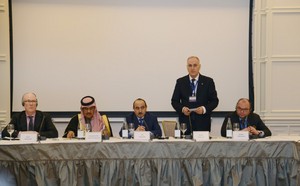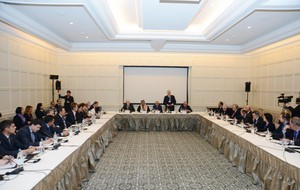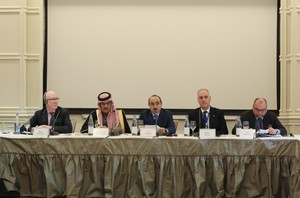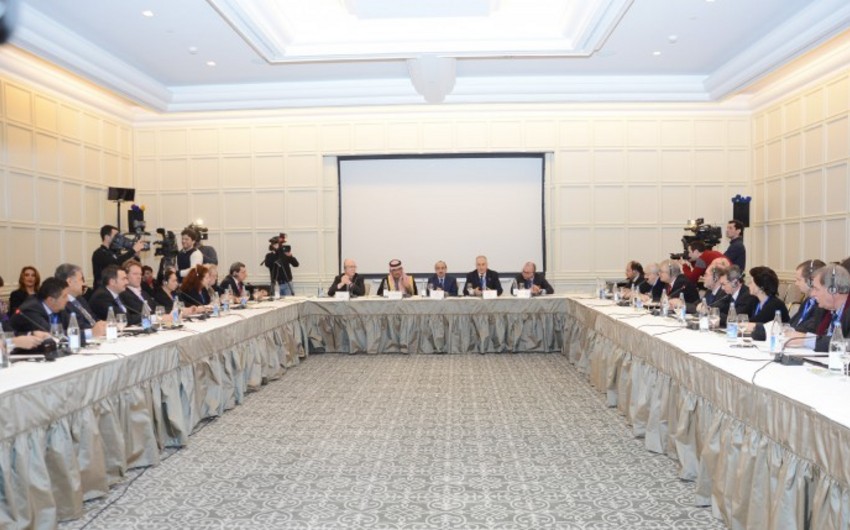Baku.2 March. Participants of the meeting of the News Agencies World Council (NACO) and a ceremony to mark the 95th anniversary of Azerbaijan State Information Agency AZERTAC have met Azerbaijani President`s Assistant for Public and Political Affairs Ali Hasanov.
In his opening remarks, Director General of AZERTAC Aslan Aslanov thanked “all the guests who are in Baku today to attend the meeting of the News Agencies World Council (NACO) and celebrations of the 95th anniversary of the founding of AZERTAC”.
“You know that at the present time when the system of international relations is witnessing serious transformations, information has started to play a broader, global role.”
Mr Aslanov said: “The world is changing. And not always in the direction we want because time has its own challenges, and we have to address them. From this point of view, a number of questions emerge that concern us, particularly representatives of classical, traditional media.
We, the newsmakers, carry the main burden of finding answers to these questions amid the wave of revolutionary changes forced by the development of advanced technologies and at a time when the rules of the game are sometimes violated and when we witness the spread of biased news.”
“To address these issues we gather at spring and autumn sessions of the European Alliance of News Agencies, meetings of the Organization of Asia-Pacific News Agencies and at Baku International Humanitarian Forum, which annually brings together acclaimed politicians, scholars and media leaders from almost all continents.”
Mr Hasanov welcomed “the participants of the News Agencies World Council meeting and heads of foreign news agencies who attend celebration of the 95th anniversary of AZERTAC, in the capital of Azerbaijan, which has an ancient history, rich culture and democratic traditions”.
“As you know the decision to hold the 5th News Agencies World Congress (NAWC) in Baku in 2016 was made at the 4th Congress in Riyadh, the capital of the Kingdom of Saudi Arabia, in November 2013. Based on this decision, AZERTAC will hold the presidency of the Congress from 2016 to 2019. I thank the leadership of the Council and its member agencies for their confidence in Azerbaijan.
He said: “Along with the 5th News Agencies World Congress, Baku will host the 16th General Assembly of the Organization of Asia Pacific News Agencies (OANA) in 2016. OANA is one of the most influential international media organizations, and its founding was initiated by UNESCO. The decision to hold the OANA General Assembly in Azerbaijan was made in Moscow in September 2013. We consider these decisions to be yet another evidence of the growing international prestige of Azerbaijan as well as integration of the country`s national news agency AZERTAC into the global information system.”
“Today you will hold the second meeting of the News Agencies World Council in Baku. Many of you have already visited Azerbaijan, and some of you visit our country and our city for the first time. I believe that the visit will be a good opportunity for you to familiarize yourselves with Azerbaijan.”
Mr Hasanov said: “Considered a bridge between the East and West as well as various civilizations throughout history, Azerbaijan has always been remarkable for its tolerance and hospitality. Azerbaijan is a country where the first parliamentary democratic republic in the Muslim East was established 97 years ago, the first secular theater was created 142 years ago, the first opera in the East was composed 107 years ago, the first newspaper was published 140 years ago, and the first national news agency was founded 95 years ago.”
“The Azerbaijan Democratic Republic collapsed as a result of the Soviet empire’s military aggression in 1920. Azerbaijan was forced to be part of the Soviet empire for 70 years. During these years, Azerbaijan had no access to global information system. It was not able to promote its culture and historical realities abroad. These years saw the formation of Soviet ideology-journalism in Azerbaijan. But after Azerbaijan regained its independence in 1991, our media integrated into the international information system, started to benefit from the traditions of global journalism, and free media emerged in the country. To ensure this, very important political and legal reforms were carried out, a legal framework was laid. Censorship was abolished in Azerbaijan in 1998. A year later the law “On mass media” was adopted. These democratic reforms also included the abolition of the Ministry responsible for control over the press, adoption of the law "On Television and Radio Broadcasting", and the law "On access to information", and other measures.”
“Another important legal document related to the media came into effect in 2008. Titled "A concept of state support for the development of the media in the Republic of Azerbaijan", this document was approved by Mr. President. It reflects the fundamental principles of the development of the freedom of thought, speech and press.”
He said: “By enumerating these measures I want you to have a clear picture of the continuous work to build a free, democratic, secular information environment in Azerbaijan. The Azerbaijani government can not imagine its internal life without free press. The media in Azerbaijan are completely free: they can raise and write about any issue.”
“About 5,000 media outlets were registered in Azerbaijan, including around 40 daily, 300 weekly and monthly newspapers, over 100 magazines, 55 television and radio channels, numerous online resources, approximately 20 news agencies.”
“The country has a free access to the Internet. Even the most remote regions of the country have access to both mobile and other types of Internet connection. This paves the way for the expansion of social media in our country. The number of Facebook users is approaching 1.5 million in Azerbaijan,” said Mr Hasanov.
“The mass media face very important tasks amid the ongoing globalization. In some cases, the media face problems, I would say, even serious, fatal problems. There is a tough competition. Of course, competition among media organizations is natural. But this competition must be sound, it must be aimed at enriching universal values, rather than at damaging them.”
“Unfortunately, in some cases, we see the contrary. Even very influential media outlets cover what is happening in the world from different angles and in compliance with their political interests. In some cases, they spread unreliable or biased information. And this undermines the bilateral relations in the international community. Of course, media organizations, news agencies pursue their own information policy. It is natural. However objectivity, impartiality, reliability of facts is crucial. Only through this we can achieve a common understanding based on common sense. This is especially important today when humanity faces threats such as political conflicts, terrorism, separatism, religious extremism and transnational crime. The opportunity to receive objective information enables people to make proper judgment of what is happening not only in their own countries, but also in the world,” he added.
Other speakers included President of the News Agencies World Congress, president of the Saudi Press Agency (SPA) Abdullah bin Fahd al-Hussein, president of the European Alliance of News Agencies (EANA), Chief Executive of Press Association Clive Marshall, and president of the Organization of Asia-Pacific News Agencies (OANA), Director General of Russian TASS news agency Sergei Mikhailov.





 https://static.report.az/photo/659ecbea-b90c-4ae7-8cb4-732eba9ec2c2.jpg
https://static.report.az/photo/659ecbea-b90c-4ae7-8cb4-732eba9ec2c2.jpg

